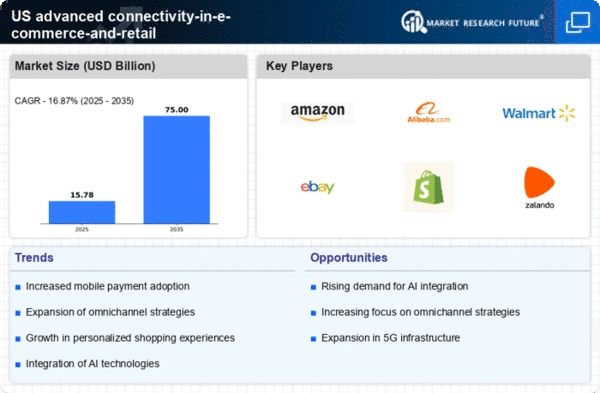Expansion of 5G Technology
The rollout of 5G technology is poised to revolutionize the advanced connectivity-in-e-commerce-and-retail market. With its high-speed data transfer capabilities, 5G enables seamless online shopping experiences, reducing latency and enhancing customer satisfaction. As of November 2025, it is estimated that 5G networks cover over 70% of urban areas in the US, facilitating faster transactions and real-time inventory management. Retailers leveraging 5G can implement augmented reality (AR) applications, allowing customers to visualize products in their environment before purchase. This technological advancement is likely to drive consumer engagement and increase conversion rates, thereby contributing to the overall growth of the advanced connectivity-in-e-commerce-and-retail market.
Growth of Omnichannel Retailing
The shift towards omnichannel retailing is a significant driver in the advanced connectivity-in-e-commerce-and-retail market. Retailers are increasingly integrating various sales channels, including online platforms, mobile apps, and physical stores, to provide a cohesive shopping experience. As of November 2025, studies indicate that 73% of consumers prefer shopping through multiple channels, highlighting the necessity for retailers to adopt an omnichannel approach. This strategy not only enhances customer satisfaction but also allows for better data collection and analysis, enabling retailers to tailor their offerings. Consequently, the growth of omnichannel retailing is expected to bolster the advanced connectivity-in-e-commerce-and-retail market, as businesses invest in technologies that support seamless transitions between channels.
Adoption of Blockchain Technology
The adoption of blockchain technology is emerging as a transformative driver in the advanced connectivity-in-e-commerce-and-retail market. This technology offers enhanced transparency and security in transactions, which is increasingly important to consumers. As of November 2025, it is estimated that 30% of retailers in the US are exploring blockchain solutions to improve supply chain management and ensure product authenticity. By providing a decentralized ledger, blockchain can help mitigate fraud and enhance trust between consumers and retailers. This growing interest in blockchain technology is likely to reshape the landscape of the advanced connectivity-in-e-commerce-and-retail market, as businesses seek to leverage its benefits for competitive advantage.
Rise of Subscription-Based Models
The rise of subscription-based models is significantly influencing the advanced connectivity-in-e-commerce-and-retail market. Consumers are increasingly drawn to subscription services that offer convenience and value, such as curated product boxes and exclusive access to new items. As of November 2025, the subscription e-commerce market in the US has grown by over 20% annually, reflecting a shift in consumer purchasing behavior. Retailers are adapting by implementing subscription options that cater to specific customer needs, thereby enhancing customer retention and lifetime value. This trend not only drives revenue but also encourages businesses to invest in advanced connectivity solutions to manage subscriptions effectively, further propelling the growth of the advanced connectivity-in-e-commerce-and-retail market.
Increased Consumer Demand for Personalization
Consumer demand for personalized shopping experiences is a driving force in the advanced connectivity-in-e-commerce-and-retail market. As of November 2025, approximately 80% of consumers express a preference for brands that offer personalized recommendations based on their shopping behavior. This trend compels retailers to utilize advanced data analytics and machine learning algorithms to curate tailored experiences. By leveraging customer data, retailers can enhance product recommendations, targeted marketing, and customized promotions, thereby fostering customer loyalty. The emphasis on personalization not only improves customer engagement but also drives sales, making it a crucial factor in the evolution of the advanced connectivity-in-e-commerce-and-retail market.
















